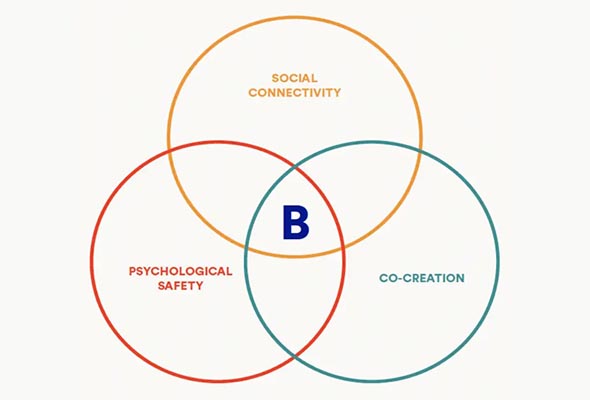Our approach to building strong communities draws on evidence-based best practices from the science of intergroup contact, innovation/collaboration, and resilience. We are guided by three principles:

1. Belonging is Multi-Faceted
In our framework, belonging consists of three concepts: connection (feeling emotionally connected to the community, welcomed and included, and satisfied with one’s relationships), psychological safety (feeling able to be one’s whole self and express disagreement, feeling valued), and agency or co-creation (understanding how one’s community works, feeling treated as an equal, and feeling able to influence decisions). For more information, see The Belonging Barometer: The State of Belonging in the US.
To foster community belonging, it is not enough to design for connection—we must design for psychological safety and co-creation, too.”

2. Connection (Across Differences) Matters
We’re in a loneliness epidemic—but simply spending more time with others isn’t enough.
Not all connection builds true belonging. When we mostly spend time with people just like us (what researchers call bonding capital), we may feel closer to our own group—but more disconnected from the broader community. This creates what’s known as a belonging gap.
Right now, the U.S. is more socially segregated than it’s been in decades. That separation makes it easier for fear and misunderstanding to take root—and harder to build trust across lines of difference.
But there’s good news: Most people want to connect across divides—they just don’t feel they have the chance. And people with more local connections across difference report feeling a stronger sense of belonging and civic engagement.
That’s why how we design for connection—and with whom—matters more than ever.
To foster belonging, design for meaningful and sustainable connections across differences.

3. Evidence-Based Design
Research reveals the design principles that are necessary for effective intergroup contact, innovation and community-level resilience. We work with civic and municipal leaders to: assess the state of belonging and connectivity in their community (diagnostics); incorporate best practices into local institutions, policies, processes, programs, and communications; and then track their impact for the population at large, as well as across groups.
Apply Insights To Your Community
Interested in applying these insights to your community? We have the tools to help you diagnose your community’s needs, design effective interventions, and measure their impact.
We Make Change Happen
Belonging, social capital and social cohesion are associated with outcomes that are invaluable to communities: